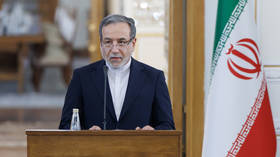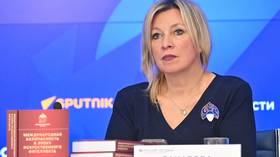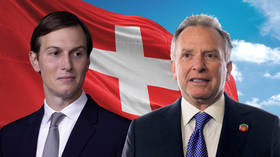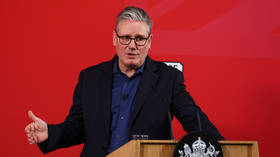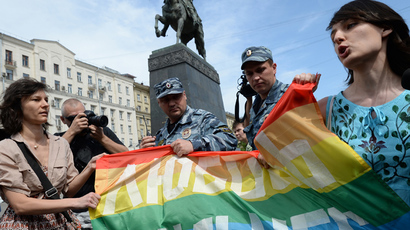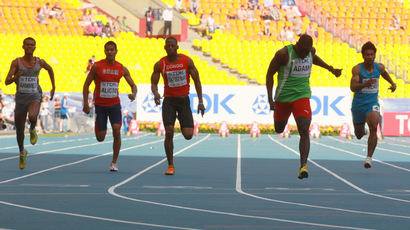Pole vault champion Isinbayeva under fire over ‘gay propaganda’ comments
Olympic pole vault champion Yelena Isinbayeva has come under fire from LGBT activists after defending Russia’s controversial “gay propaganda” law. After some athletes branded her “homophobic,” she has rejected the accusation she is anti-gay.
LGBT rights and sporting events have become closely linked in Russia after numerous calls from activists and politicians to boycott the Sochi Winter Olympics in a protest against the legislation.
On Thursday Isinbayeva, one of Russia’s most famous athletes and the face of the Moscow World Athletics Championships, commented on a protest by Swedish athletes Emma Green Tregaro and Moa Hjelmer, who painted their fingernails in rainbow colors in support of LGBT rights.

The protest was disrespectful toward Russia and its laws, Isinbayeva told reporters.
"Maybe we are different than European people and people from different lands. We have our law which everyone has to respect,” Isinbayeva, 31, said at an English-language press conference. “When we go to different countries, we try to follow their rules. We are not trying to set our rules over there. We are just trying to be respectful."
Isinbayeva said that heterosexual relations are historically considered “normal and standard” in Russia and that “if we really allow [gays] to promote and do all this stuff in the streets,” it would cause problems.
She added that she saw no harm in gay people per se, and particularly in gay athletes competing in Russia.
"It's their life, it's their choice, it's their feelings, but we're just against the publicity in our country and I support that," Isinbayeva said.
Isinbayeva’s comments were quick to draw fire from critics of the controversial Russian law. American middle-distance runner Nick Simmonds, who earlier dedicated his gold medal at the Moscow World Athletics Championships to his LGBT friends, accused Isinbayeva of homophobia.
“It blows my mind that a young, well-educated woman can be so behind with the times. Guess what, Yelena: a large portion of your citizenship are normal, standard homosexuals,” Symmonds said in an interview with BBC Radio 5 Live.

British heptathlete Louise Hazel said Isinbayeva was being openly homophobic and that her position as a Youth Olympics ambassador should be reviewed by the International Olympic Committee over her comments. "It should be their first point of call after the championships are over," Hazel told the BBC.
"I would be worried if my children or the next generation of athletes were looking to Yelena Isinbayeva and thinking that these comments are acceptable. Quite simply, I don't think they are,” Hazel said. "They're sending the message that discrimination is OK, and it quite clearly is not in this day and age."
The IOC has so far distanced itself from the controversy. Committee officials have spoken against the calls to boycott the Sochi Olympics, and said that the event should not be subject to political debates.
Speaking Friday after the barrage of criticism, Isinbayeva said that her words had been misinterpreted.
“English is not my first language and I think I may have been misunderstood when I spoke yesterday,” she said. “What I wanted to say was that people should respect the laws of other countries, particularly when they are guests.”
“I respect the views of my fellow athletes and let me state in the strongest terms that I am opposed to any discrimination against gay people,” the athlete added.
Ben Harris of conservative UK think tank The Bow Group spoke to RT about why Russia's new legislation has caused such an uproar around the world.
“It’s a point of international engagement with Russia,” Harris said. “I don’t think it’s appropriate to air political views in that forum. Clearly there are many athletes that feel the same way...and it’s far from just Russia. We were in Beijing in 2008. Hopefully we’re going to be in Qatar as well. And it’s about going to those countries and focusing on the sport and not focusing on the differences between the culture and the laws in those countries.”
The IAAF, the world governing
body for athletics, said in a statement that it believed
“in free expression as a basic
human right, which means we must respect the opinions of both
Green Tregaro and Isinbayeva."
Russia’s “gay propaganda” law forbids the promotion of “non-traditional” sexual relations to children under the age of 18, on penalty of a fine. Foreigners can be deported or sentenced to up to 15 days in custody for violating the law.
The legislation was criticized in the country for vague wording regarding the difference between “gay propaganda” and sex education. There is concern that the legislation could be used arbitrarily used to persecute LGBT people.
Sponsors of the law say it defends family values and imply that it would be used only against organizers of unsanctioned gay pride demonstrations, which in the past led to clashes between pro-LGBT and anti-gay activists.
According to opinion polls, the majority of Russians support the controversial legislation.


